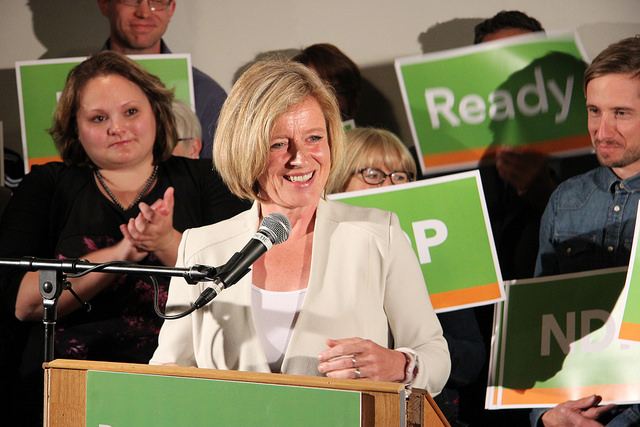The polling data coming out of Alberta is almost too unexpected to believe: 308.com’s latest composite figures pegged the NDP picking up 41.8 per cent of the popular vote, a full 15 per cent above the Wildrose and Progressive Conservatives.
Many factors can account for this. The PCs have been inundated with scandals over the past month, compounding distrust fostered in the fall-out from the Alison Redford debacle. Throw in bribery allegations, arrogance and a striking friendliness with corporations, and it’s understandable why Albertans are beginning to question why they’ve allowed such a party to govern for coming on a half-century.
But such an account, while true, neglects the immense work the NDP have done over the past month to generate such a cohesive following. Here’s five reasons the NDP should win the election.
1. The benefit of history
The surname Notley is a familiar one for many older Albertans; Grant Notley was a long-time Alberta NDP chief (elected in 1968) and Official Opposition leader (from 1982 until his death two years later). Such a reality has undoubtedly assisted in the establishment of trust in Rachel, his daughter and party leader.
That fact, combined with the way the party’s managed to harness the Orange Crush narrative of the 2011 federal election (one pollster going as far to suggest that Notley’s possesses some “shades of Jack Layton“), has given reassurance to Albertans, who might not otherwise vote for a social democratic party, that the NDP are a legitimate alternative.
2. Positioning a strong message
Provincial manifestations of national parties can differ quite significantly, depending on the perceived willingness of constituents to vote for a ‘left-of-centre’ option. That’s particularly relevant in Alberta; while the NDP are certainly a more progressive party than the PCs or far-right Wildrose — offering, for instance, a two-per cent hike in corporate tax rates and reversal of deep cuts to education and health care — they’re by no means a full-blown socialist, Regina Manifesto-style organization (in other words, there’s no talk of nationalizing the tar sands or abolishing capitalism).
The PCs have deployed some Red Scare tactics, attempting to convince the populace that the NDP will kill jobs and dismantle the economy. It doesn’t seem to be working. Some 30 per cent of decided voters who opted for the PCs in 2012 are planning to vote for the NDP.
3. Being honest about the oil and gas sector
The energy sector’s the foundation on which Alberta’s economy rests, accounting for 23.1 per cent of its GDP and directly employing over 120,000 people. But ever since the Ed Stelmach royalty disaster of 2009 — in which the government’s take of resource revenue was boosted by a significant 20 per cent — the PCs have avoided any discussion of revisiting the royalty regime.
Sure, the NDP’s energy strategy’s a bit vague, as detailed by University of Alberta professor Andrew Leach in a recent Maclean’s feature. But it’s at least something — contrast that with devoted opposition from the Wildrose and PCs, parties that are both convinced a royalty review would compromise future investment in an economy that can’t really afford any more hits.
It seems many Albertans are of the opinion that they’ve been ripped off by corporations over the years, so the NDP’s insistence on a review has surely gained the party some ground.
4. Treating voters as people
There’s an incredible amount of mistrust of politicians in Alberta, with many coming off more as House of Cards characters than elected officials. The Wildrose have benefited from this fact, pointing to the notorious Christmas floor-crossing as evidence that the bad apples have already abandoned the party so that those petitioning for an intensely neoliberal agenda are in it for the long haul.
But the NDP have arguably tapped into this distrust in a more meaningful way: take for example the recent revelation that Edmonton-Strathcona voters will have to travel four kilometres to cast a ballot, disadvantaging seniors, disabled and otherwise mobility-impeded voters. Notley immediately tweeted that the party would drive anyone in the riding to the voting location.
It’s an approach that reflects and solidifies the for-the-people narrative the NDP’s historically mastered and has harnessed in this election. Not taking donations from corporations also helps.
5. Standing their ground
The NDP received a bit of flak early on in the election for refusing to collaborate with other progressive parties. The argument went that the PCs would inevitably win so it was in the best interest of all centre-left parties to run single candidates in ridings (as evidenced most notably in Edmonton-Centre, where Laurie Blakeman is running on behalf of the Liberals, Greens and Alberta Party). The NDP refused, contending that they had a unique platform that would be distilled via collaboration.
The tactic seems to have worked out for them — if the predicted popular vote’s something that can be counted on, that is — allowing a unique (read: orange) brand to cement in voters’ minds.
After all, as many commenters will say, this election’s more about trust than anything else, so consolidating support behind a single leader and platform (as opposed to a potentially wishy-washy progressive coalition) might end up working out in NDP’s favour.
James Wilt is a freelance writer in Calgary. He’s previously worked as staff writer for Fast Forward Weekly, the city’s alt-weekly newspaper, and has recently contributed to VICE Canada, DeSmog Canada and Geez magazine.
Photo: flickr/Dave Cournoyer



